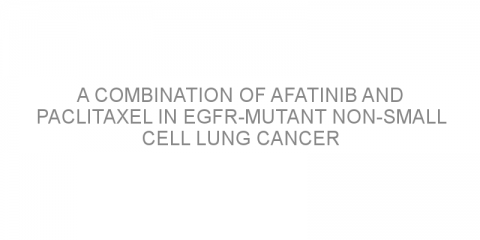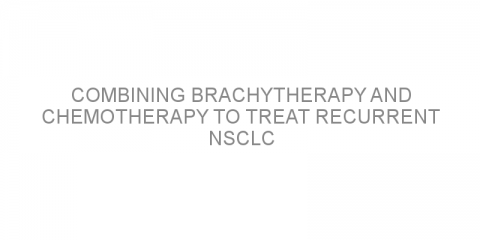In a nutshell This study compared the safety and effectiveness of afatinib (Gilotrif) and erlotinib (Tarceva) as second-line treatments for advanced squamous cell carcinoma (SCC). Authors reported improved survival and disease progression with afatinib compared to erlotinib. Both treatments were associated with a good safety profile. Some background...
Read MoreTreatment(s) already received-Chemotherapy Posts on Medivizor
Role of stereotactic body radiotherapy in patients with positive margins after rectal cancer surgery
In a nutshell This study investigated the role of stereotactic body radiotherapy (SBRT) in patients with positive margins (when the cancer is not totally removed) after chemotherapy, radiation therapy and rectal surgery. Researchers suggested that SBRT is an effective and safe treatment option. Some background Chemotherapy and radiation therapy...
Read MoreRe-evaluation of the tumor is beneficial for treatment planning in advanced rectal cancer patients
In a nutshell This study investigated the necessity of re-evaluation of locally advanced tumors (spread to the lymph nodes) after chemotherapy and radiation therapy. Researchers reported that re-evaluation is important to better plan treatment. Some background Chemotherapy and radiation therapy (CTRT) followed by surgery is the standard...
Read MoreA combination of surgery and chemotherapy increases survival in stage 4 colorectal cancer
In a nutshell This study investigated the impact of surgery in patients with stage 4 (spread to other areas of the body) colorectal cancer who were treated with chemotherapy. Researchers reported that surgery increased survival in these patients. Some background Prior studies have reported increased survival in patients with stage 4...
Read MoreInvestigation of the effectiveness and safety of treatment with neratinib
In a nutshell This study investigated the effectiveness and safety of neratinib treatment in patients with early-stage HER2+ breast cancer. The study concluded that neratinib significantly improved 2-year invasive disease-free survival in women with HER2+ breast cancer. Some background HER2 positive (HER2+) breast cancer is dependent on the...
Read MorePalbociclib therapy for metastatic breast cancer
In a nutshell The authors aimed to determine if palbociclib (Ibrance) could help treat women with metastatic (spread to other areas of the body) breast cancer. The researchers concluded that palbociclib showed good response rates from women with metastatic breast cancer whose cells expressed a protein called retinoblastoma (Rb). Some background...
Read MoreA combination of afatinib and paclitaxel in EGFR-mutant non-small cell lung cancer
In a nutshell This study aimed to determine the efficacy of a combination of the anticancer drugs afatinib (Gilotrif) and paclitaxel (Taxol) to treat non-small cell lung cancer (NSCLC), compared to chemotherapy alone. The study found that a combination of these drugs significantly improved progression free survival (PFS, time from treatment until...
Read MoreCombination of hormone therapy and chemotherapy in advanced prostate cancer
In a nutshell The authors aimed to determine whether hormone drugs abiraterone (Zytiga) and enzalutamide (Xtandi) and chemotherapy drug cabazitaxel (Jevtana) improved overall survival (patients who were still alive after treatment) in prostate cancer patients with advanced, hormone-resistant (castration-resistant) prostate...
Read MoreCould neurogenesis be the key to understanding chemobrain?
Cognitive side effects to chemotherapy, often called “chemobrain” or “chemofog”, are a growing concern among cancer survivors. Symptoms such as a decline in memory, concentration and executive functions (such as organization or attention) are often described. Cognitive changes can cause significant distress and prevent a return to...
Read MoreNew chemotherapy combinations – effectiveness and safety?
In a nutshell This trial evaluated the safety and effectiveness of the drug lapatinib (Tykerb) when used in combination with other chemotherapeutic drugs to treat women with metastatic HER2 positive breast cancer. This study concluded that lapatinib combined with vinorelbine or gemcitabine were effective in these...
Read MoreCould neurogenesis be the key to understanding chemobrain?
Cognitive side effects to chemotherapy, often called “chemobrain” or “chemofog”, are a growing concern among cancer survivors. Symptoms such as a decline in memory, concentration and executive functions (such as organization or attention) are often described. Cognitive changes can cause significant distress and prevent a return to...
Read MoreCombining brachytherapy and chemotherapy to treat recurrent NSCLC
In a nutshell This trial examined the effectiveness of combining brachytherapy (a type of radiation) and chemotherapy for the treatment of locally recurrent non-small cell lung cancer (NSCLC) that has already been treated. The trial concluded that the combination of treatments was more effective than chemotherapy alone. Some background Locally...
Read More













